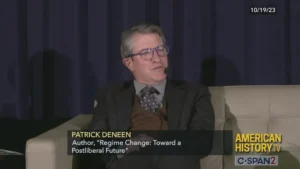(Nov. 16) When I wrote separate columns earlier this year about how two prominent New Orleanians of differing ideologies are promoting the ideals of the Declaration of Independence as its 250th birthday draws night, I didn’t realize how widely those ideals are under attack.
Nationally known historian Walter Isaacson’s short book, “The Greatest Sentence Ever Written,” is due for release this week. Laitram Industries president Jay Lapeyre, also the board chair of the national Cato Institute think tank, is pushing a treatise called “The Philadelphia Declaration for Freedom and Responsibility.”
The latter asserts not just that “a free society” is the most productive materially, but that it also is the one most conducive to the development of good character.
A growing group that claims to be on the political Right, though, is challenging America’s founding ideals largely because they claim those ideals end up being corrosive of good character both private and collective. And the leftward side of the political spectrum, which never has revered the founding generation quite so much as conservatives have, continues to further radicalize by embracing the likes of the near-radically Islamic, essentially proto-socialist Zohran Mamdani as mayor of New York.
The problem is particularly acute among young voters. A CNN exit poll showed that an astonishing 84% of women under age 30 voted for Mamdani. Large percentages of young men, though, are going in the other direction, not just voting for Donald Trump for president (56% of them did), but embracing a worldview that explicitly dismisses our founding ideals as having “failed.”
The extreme among these young men celebrate the increasingly unhinged and hateful Tucker Carlson or the openly White supremacist Nick Fuentes — but even the supposedly intellectual vanguard, very much including Vice President JD Vance, is pushing a strange set of nostrums known as “Christian nationalism” or various ideological near-relatives.
Before going further, let’s clear up some terminology. This nation’s founders essentially saw themselves as part of the “liberal Enlightenment,” with that original meaning of “liberal” (the same derivation as “liberated”) being related to “freedom.” Yet when New Deal Democrats adopted “liberal” as a modern ideological term related to government largesse, the reaction to it became known as “conservative.” Please note, however, that what the Reagan-conservative movement wanted to “conserve” was specifically the founders’ “liberal tradition,” in the original sense.

Enter political theorist Patrick Deneen (among others) who calls for a “post-liberal” order that explicitly rejects Enlightenment liberalism (and thus Reagan conservatism too) in favor of “consistent use of state power to effect ends of order and stability.” Essentially, this post-liberal order, with its fetish for state power, looks a lot like two-bit authoritarianism minus the open violence.
When Deneen writes against “the liberal project,” he isn’t aiming at Joe Biden or Hillary Clinton, but instead explicitly berating American founders via gobbledygook such as this: “The liberal project is ultimately self-contradictory, culminating in the twin depletions of moral and material reservoirs upon which it has relied even without replenishing them.”… [The full column is at this link.]






